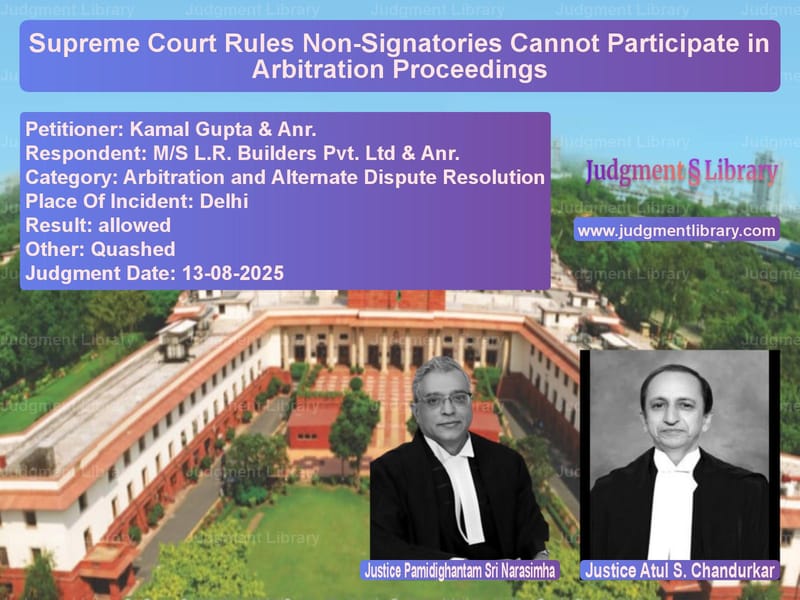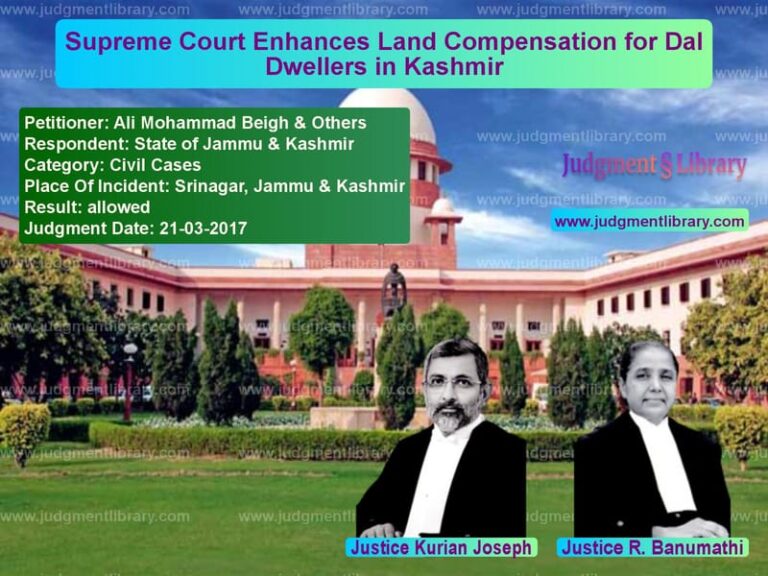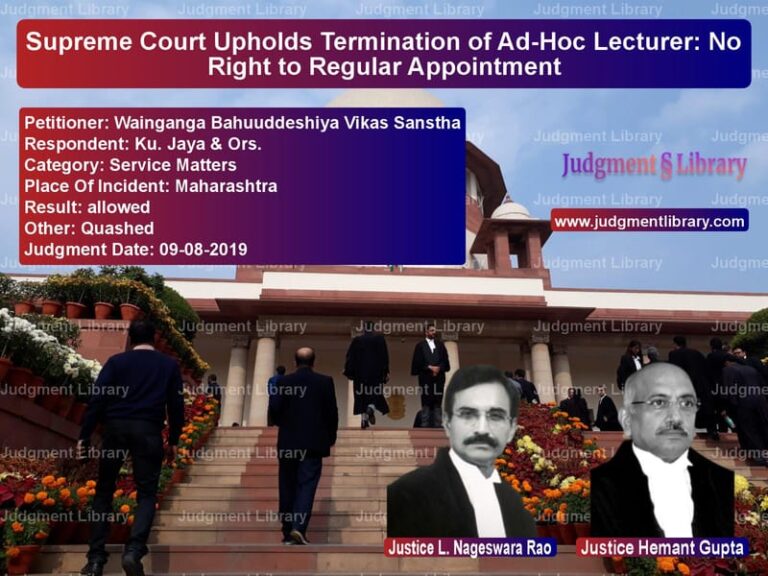Supreme Court Rules Non-Signatories Cannot Participate in Arbitration Proceedings
In a landmark judgment that clarifies the boundaries of arbitration proceedings in India, the Supreme Court has delivered a significant ruling addressing whether non-signatories to an arbitration agreement can participate in arbitration proceedings. The case involving Kamal Gupta and M/S L.R. Builders Pvt. Ltd. presented fundamental questions about the nature of arbitration agreements and the extent to which courts can intervene in arbitral processes after appointing an arbitrator. The judgment, delivered by Justice Atul S. Chandurkar and Justice Pamidighantam Sri Narasimha, reinforces the principle that arbitration is a consensual process limited to parties who have voluntarily entered into the arbitration agreement.
The dispute originated from a family settlement within the Gupta family, where an oral agreement was later reduced to a Memorandum of Understanding/Family Settlement Deed dated July 9, 2019. Notably, Rahul Gupta, the son of one of the parties, was not a signatory to this document. When disputes arose between the signatories, proceedings were initiated under Section 11(6) of the Arbitration and Conciliation Act, 1996 for appointment of an arbitrator. Rahul Gupta and several non-signatory companies sought to intervene in these proceedings, arguing that their interests were affected by the family settlement. The High Court initially dismissed their intervention applications but later permitted them to be present in the arbitration proceedings, leading to the appeal before the Supreme Court.
The Legal Questions and Arguments
The Supreme Court framed two crucial questions for determination: first, whether it is permissible for a non-signatory to an agreement to remain present in arbitration proceedings; and second, whether after appointment of an arbitrator under Section 11(6) of the Act, the court can issue further directions concerning the arbitration proceedings. The appellants, represented by Senior Advocates Mr. C. Aryama Sundaram and Mr. V. Giri, argued vehemently that the High Court had no jurisdiction to entertain applications from non-signatories after disposing of the Section 11(6) proceedings. They contended that once the arbitrator was appointed on March 22, 2024, the court became functus officio and could not entertain further applications. The appellants emphasized that “the direction as issued in the impugned order permitting the non-signatories to remain present in the arbitration proceedings therefore was without jurisdiction.”
The appellants further argued that permitting non-signatories to participate in arbitration proceedings violated the fundamental principles of the Arbitration Act. They pointed to Section 35 of the Act, which states that an arbitral award binds only the parties to the arbitration agreement and persons claiming under them. Since the intervenors were not parties to the agreement, they would not be bound by the award, and therefore had no business participating in the proceedings. The appellants also raised concerns about confidentiality, citing Section 42A of the Act, which mandates that arbitration proceedings remain confidential. They argued that “permitting a stranger to the arbitration proceedings to remain present and observe the said proceedings would result in breach of the provisions of Section 42A of the Act.”
The respondents, represented by Senior Advocates Mr. Amit Sibal and Mr. J. Sai Deepak, supported the impugned order, arguing that the undertakings given by the signatories in the original judgment created obligations that justified the intervention. They contended that since there had been a breach of assurances recorded in paragraphs 17 and 18 of the judgment dated March 22, 2024, the non-signatories were entitled to seek relief. The respondents invoked Section 151 of the Code of Civil Procedure, arguing that the court’s inherent powers allowed it to grant the relief sought. They maintained that the directions issued were merely consequential to the original judgment and did not amount to reviewing or modifying it.
The Court’s Analysis and Reasoning
The Supreme Court conducted a thorough analysis of the legal framework governing arbitration in India. The Court began by examining the fundamental nature of arbitration agreements, emphasizing that arbitration is a consensual process. The Court noted that “the provisions of Section 35 of the Act are clear inasmuch as an award passed would only bind parties to the arbitration and persons claiming under them. The expression ‘party’ has been defined by Section 2(h) of the Act to mean a party to an arbitration agreement.” This definition, the Court reasoned, explicitly excludes non-signatories from the scope of arbitration proceedings.
The Court made a crucial observation about the legal status of non-signatories in arbitration: “When the arbitration proceedings can take place only between parties to an arbitration agreement and Section 35 of the Act does not make the arbitral award to be passed binding on non-signatories to such agreement, we do not find any legal right conferred by the Act that would enable a non-party to the agreement to remain present in arbitration proceedings between signatories to the agreement.” This reasoning underscores the principle that arbitration derives its authority from the consent of the parties, and those who have not given such consent cannot participate in the process.
The Court then addressed the jurisdictional issue, examining whether the High Court could entertain applications after appointing an arbitrator. The Court firmly held that “when the application filed under Section 11(6) of the Act came to be decided on 22.03.2024 and Arbitration Petition No.1010 of 2022 came to be disposed of, there was no question of entertaining any prayer for permission to intervene in the arbitration proceedings. The sole arbitrator having been appointed by virtue of the power conferred by Section 11(6) of the Act on 22.03.2024, the Court did not have any further jurisdiction to entertain a fresh application with a prayer for permission to remain present in the arbitration proceedings.” This finding reinforces the principle of functus officio – that once a court has performed its statutory function of appointing an arbitrator, it cannot continue to exercise jurisdiction over the matter.
The Court also examined the scheme of the Arbitration Act, particularly Section 5, which restricts judicial intervention in arbitration proceedings. Quoting from the Constitution Bench decision in Re: Interplay between Arbitration Agreements, the Court noted: “Section 5 has two facets — positive and negative. The positive facet vests judicial authorities with jurisdiction over arbitral proceedings in matters expressly allowed in or dealt with under Part I of the Arbitration Act. The flip side to this approach is that judicial authorities are prohibited from intervening in arbitral proceedings in situations where the Arbitral Tribunal has been bestowed with exclusive jurisdiction.” This interpretation emphasizes the legislative intent to minimize judicial interference in arbitration proceedings.
The Court further elaborated on the self-contained nature of the Arbitration Act, stating: “The Arbitration Act is a self-contained code inter alia with respect to matters dealing with appointment of arbitrators, commencement of arbitration, making of an award and challenges to the arbitral award, as well as execution of such awards. When a self-contained code sets out a procedure, the applicability of a general legal procedure would be impliedly excluded. Being a self-contained and exhaustive code on arbitration law, the Arbitration Act carries the imperative that what is permissible under the law ought to be performed only in the manner indicated, and not otherwise.” This reasoning highlights that the Arbitration Act provides a complete framework for arbitration proceedings, and courts cannot supplement this framework with procedures not contemplated by the Act.
Confidentiality and the Integrity of Arbitration
A significant aspect of the Court’s reasoning concerned the confidentiality of arbitration proceedings. The Court emphasized that “the arbitrator, the arbitral institution and the parties to the arbitration agreement have to maintain confidentiality of all arbitral proceedings. The legislative intent behind maintaining confidentiality of information is quite clear. Permitting a stranger to the arbitration proceedings to remain present and observe the said proceedings would result in breach of the provisions of Section 42A of the Act.” This observation underscores that confidentiality is not just a procedural formality but a fundamental feature of arbitration that distinguishes it from court proceedings.
The Court also addressed the practical implications of allowing non-signatories to participate in arbitration. It noted that “the direction, even if well-intentioned, does not have any statutory support.” This highlights the Court’s commitment to ensuring that arbitration proceedings adhere strictly to the statutory framework, regardless of the apparent equities in individual cases. The Court recognized that while the concerns of non-signatories might be genuine, the proper forum for addressing those concerns is not the arbitration proceedings between other parties.
Conclusion and Implications
The Supreme Court ultimately allowed the appeals, setting aside the High Court’s order permitting non-signatories to participate in the arbitration proceedings. The Court held that “the applications filed by RG and other non-signatory companies in the disposed of proceedings were misconceived. The attempt on their behalf to re-open the proceedings amounted to an abuse of the process of law.” The Court imposed costs of Rs. 3,00,000 on the respondents, to be paid to the Supreme Court Advocates On-Record Association.
This judgment has significant implications for arbitration practice in India. It reaffirms that arbitration is strictly a matter of contractual consent, and only parties to the arbitration agreement can participate in the proceedings. The decision also strengthens the principle of minimal judicial intervention in arbitration, emphasizing that courts cannot continue to exercise jurisdiction after appointing an arbitrator. Furthermore, the judgment underscores the importance of confidentiality in arbitration proceedings, protecting this key advantage of arbitration over litigation. For businesses and individuals entering into arbitration agreements, this judgment provides clarity and certainty about who can participate in arbitration proceedings and under what circumstances. It also serves as a reminder that courts will strictly interpret the Arbitration Act and will not allow procedures not contemplated by the statute.
Petitioner Name: Kamal Gupta & Anr..Respondent Name: M/S L.R. Builders Pvt. Ltd & Anr..Judgment By: Justice Pamidighantam Sri Narasimha, Justice Atul S. Chandurkar.Place Of Incident: Delhi.Judgment Date: 13-08-2025.Result: allowed.
Don’t miss out on the full details! Download the complete judgment in PDF format below and gain valuable insights instantly!
Download Judgment: kamal-gupta-&-anr.-vs-ms-l.r.-builders-pv-supreme-court-of-india-judgment-dated-13-08-2025.pdf
Directly Download Judgment: Directly download this Judgment
See all petitions in Arbitration Awards
See all petitions in Arbitration Act
See all petitions in Commercial Arbitration
See all petitions in Enforcement of Awards
See all petitions in Settlement Agreements
See all petitions in Judgment by P.S. Narasimha
See all petitions in Judgment by Atul S. Chandurkar
See all petitions in allowed
See all petitions in Quashed
See all petitions in supreme court of India judgments August 2025
See all petitions in 2025 judgments
See all posts in Arbitration and Alternate Dispute Resolution Category
See all allowed petitions in Arbitration and Alternate Dispute Resolution Category
See all Dismissed petitions in Arbitration and Alternate Dispute Resolution Category
See all partially allowed petitions in Arbitration and Alternate Dispute Resolution Category







